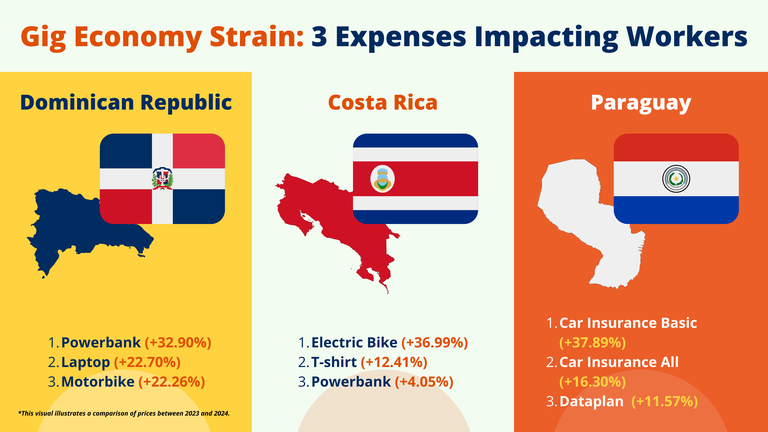
Latin America is undergoing significant regulatory changes, highlighted by Mexico's newly approved labour reform and ongoing legislative discussions in Colombia and Costa Rica aimed at better regulating the platform economy. However, as these laws take time to implement, platform workers are grappling with a severe cost-of-living crisis.
Taking Costa Rica as an example, despite low inflation, an analysis by the CECR (College of Economic Sciences of Costa Rica) shows that typical households continue to feel the pressure of the cost of living, driven by rising prices for basic consumer goods and lower purchasing power. This reflects the CECR's concern for the quality of life in Costa Rican society.
Other research, a survey of the cost of living in over 200 cities across five continents, includes the most expensive cities in Latin America and the Caribbean, and the third on the list is the capital of Costa Rica, San José. Only Mexico City and Nasáu (Bahamas) are ahead of it.
The rising cost of living hasn't gone unnoticed by platform workers: the quarterly WageIndicator data collection across the region shows that some of the most expensive work-related items for delivery drivers, taxi drivers, and remote online workers are electric bikes, items of clothing such as T-shirts, and power banks - all essential items.
Online remote workers are particularly affected in the other two countries considered: Dominican Republic and Paraguay.
Data plans and laptops are among the items that have seen an increase in price compared to the previous year, with laptops up 22.7% in the Dominican Republic, and data plans up 11.57% in Paraguay.
Although the official measure of inflation in the Dominican Republic is lower than it has been in recent years (December data), price increases are still affecting people's purchasing power. In December, the Regional Centre for Sustainable Economic Strategies (CREES) warned that the Consumer Price Index, which measures the weighted average prices of the most representative items in the basic basket, continued to rise.
It's worth noting that the high cost of living was the main complaint of Dominicans during the general elections in May.
The situation in Paraguay is equally concerning. Although official data from the Central Bank of Paraguay (BCP) indicates relatively low inflation rates, the reality experienced by consumers tells a very different story.
The cost of basic goods has skyrocketed, hitting Paraguayan families hard. Food and basic healthcare have become more expensive, as has public transport. The higher price of public transport is particularly worrying for those who are also experiencing an increase in the price of car insurance (+37%, basic, +16% with all, as the WageIndicator data shows. This makes getting from place to place even more difficult, and not just for app-based taxi drivers.
As governments work toward better protections for workers, the urgent need for immediate economic relief cannot be overlooked.
